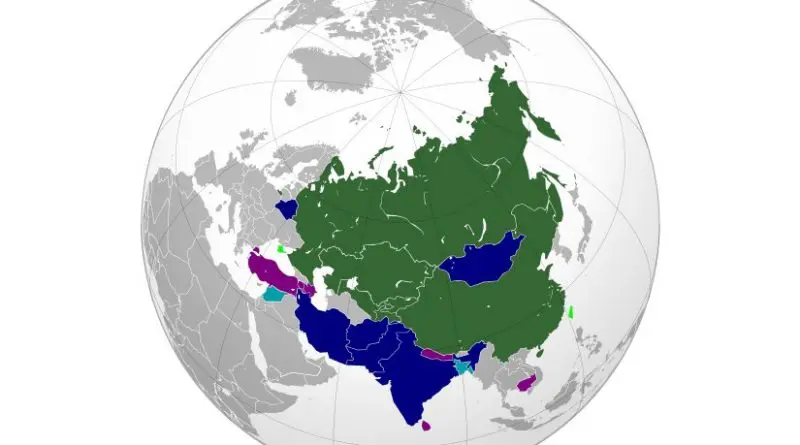Shanghai Cooperation Organization, Belt And Road Initiative And CPEC – OpEd
During the 17th Shanghai Cooperation Organization (SCO) summit held in Astana, Kazakhstan on June 9, 2017, Pakistan along with India became full members of SCO.
Created on June 15, 2001 in Shanghai, the main focus of the organization is countering three evils of terrorism, separatism and extremism. The members of the organization are sharing intelligence and military expertise for tackling drug trafficking and cross border crimes in globalized world. The presence of emerging China and resurgent Russia makes SCO very important organization in world politics. The expansion of SCO with the inclusion of Pakistan and India has expanded the outreach of this organization to South Asia. Full membership of SCO essentially make Pakistan part of security architecture of Central Asia. Inter-regional interaction at SCO platform will enhance the role of regional powers for creating productive ways for engagement for mutual benefit in economic and security realm.
In a globalized world and increasingly connected regions, the peaceful neighborhood is directly linked with economic rise of countries of the region. For a smooth inflow of raw materials to China and outflow of finished goods to the world, peace in its neighborhood is paramount for continued economic development of China.
The real dividends of economic development can only be reaped in peaceful environment. The SCO will provide both Pakistan and India regional cooperation platforms for economic development. The expectation from Pakistan and India by other SCO members is that both these countries will use the SCO as platform for cooperation and keep their rivalry out.
With its economic rise, China is demanding role in international politics reflective of current economic realities. Vladimir Putin has long been working for creation of multi-polar word where Russia again becomes major power of the world. The convergence of interest between Russia and China is reflected in beneficial partnership in which Russia is taking lead in engaging with countries through military industry while China is forging long term economic partnerships.
Russian Foreign Minister Sergey Lavrov, while addressing the 53rd Munich Security Conference, on February 18, 2017 stated need for developing more equitable and democratic world order. While he rejected the allegations of those who accuse Russia and the new centers of global influence of attempting to undermine the so-called ‘liberal world order’, he identified the flaws of this systems which was designed as an instrument for ensuring the growth of an elite club of countries and its domination over everyone else.
Russia along with rising powers in Asia has long been trying for “building a democratic and fair world order, a post-West world order, in which each country develops its own sovereignty within the framework of international law, and will strive to balance their own national interests with those of their partners, with respect for each country’s cultural, historical and civilizational identity”. He essentially tried to deliver message to leaders from the West that power transition with the economic rise of China was inevitable in not so distant future. While China is economically developing, it’s establishing long term engagement with partner countries for mutual benefit on the basis of win-win strategy.
The Belt and Road Initiative (BRI) by Chinese president Xi Jinping is strategic economic statesmanship for reordering international order through the power of economy. The Chinese vision of rising together holds great promise for developing countries facing the problems of capital shortage.
The connectivity through BRI will knit the developing countries in Asia, Africa with China being the pivotal state for driving the world economy in future. The rise of China will be the rise of East. China Pakistan Economic Corridor (CPEC) has become the main corridor under BRI. Rapid completion of energy and communication projects under CPEC is promising for establishing Pakistan as state facilitating the regional trade and connectivity.
India despite Pakistan and China’s offer to become part of CPEC has stayed away from China led regional connectivity initiative on the grounds that CPEC violates India’s sovereign in Jammu and Kashmir. Indian stubbornness is irrational and against the United Nations Security Council resolution that accept state of Jammu and Kashmir as disputed territory between Pakistan and India. As CPEC does not change the status of state of Jammu and Kashmir, Indian opposition and subversive activities against the mega economic project is immensely destabilizing for economic rise of South Asia. Russia is supporting the BRI which essentially means endorsing CPEC for regional connectivity. After becoming member of SCO, there are expectations from India that it will stop irrational policy of opposition to CPEC and engage with China and Russia for regional connectivity through Pakistan.
*The author is working with Strategic Vision Institute (SVI) as Research Associate.


Good commentary on the state of play in southern tier of Central Asia. Central Asian nations had a critical need for a seaport link – now Pakistan has provided the answer to their search for a natural harbor since independence from USSR. Ironically Indians who had been offering to settle the Kashmir dispute by accepting the ceasefire-line as a border are now shiftily staking a dubious claim to Pakistan’s Northern provinces contradicting their own position on the dispute. It is like a spoilt brat who first insists on the best toy for himself, then tries to snatch the toy in other child’s hands since it seems to be giving joy & comfort to that child which is unbearable for the brat. Indians should not be that brat as Northern areas are not their toy but belongs to millions of beef-eating Muslim natives of the land of K2. No one cares about India in those majestic mountains!